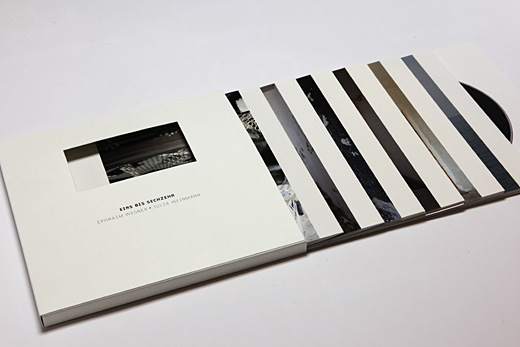
Crónica is very proud to present the new release by Ephraim Wegner & Julia Weinmann, “eins bis sechzehnâ€, a luxurious CD + booklet edition in a joint release with Anti Matter Plant and the Kunsthochschule für Medien Köln.
“eins bis sechzehn†is now available directly from Crónica or from selected retailers.
All photos and audio recordings in this work are taken inside the ruins of former hotels. If one enters such a place, first of all the impression of demolition is overwhelming, while at the same time one finds a fascinating world between decay and renewal. The history of these ruins, with their former purpose of usage as well as the changes caused by time, give the place its own organic life cycle, with plants and animals living inside the ruins and debris.
Locals from the surrounding area are looking for usable raw and building materials. And the beaches are slowly filled up again with tourists from all over the world. Reminiscences of the heyday 1960s up to the 1980s arise when extensive hotel resorts were “le dernier cri†for millions of tourists to make their individual holiday dreams come true. Non-lieus, monofunctionally used areas resembling each other by interchangeability and absence of history. Massive holiday resorts as Heterotopoi as intended by Foucault.
However, a “non-lieu†for one person may be a place for another who identifies with and establishes a special relationship to it. In each of these buildings lots of people lived for only a few days or weeks – sometimes even years – just for the length of their stay. Many short episodes and stories started and ended here, and “Lieu†and “non-lieu†become shunning poles: a “lieu†never disappears completely, just as no absolute “non-lieu†exists.
What remains are the complicated dynamics of identity and relation, of space and time. Inspired by these impressions, both artists built their own virtual hotel composed from the rooms of several ruins. The viewer / auditor is taken through this fictive hotel as a tourist, becoming part of a vacant imaginative place that tells its very own story by means of visual and audible images. The sound of gigantic concrete structures, of the nearby sea, the presence of several, quite small appearing individuals develops an independent existence and give an idea of the former activity. The photographs depict the places where the sound-recordings took place. They are linked chronologically to the composition and by showing the same localities serially they also point out to the functionality of these resorts as places for mass tourism.
In the musical sense the single photo series correspond to the stanzas or sentences of the single subjects. Although parts of the original sound material were processed by FFT or granular synthesis, there is no sound in the whole work that isn’t strictly connected to the locality of the respective picture. In both cases of sound alienation the state of the original recording — the image of a space at a certain time — serves further compositional procedure: by means of FFT certain frequencies were identified and either deleted or boosted; through the application of granular synthesis, the recorded sound is stripped down into several small sonic particles. As places can change their appearance and their atmosphere by certain, sometimes more or less overlapping events, the character of sound can be deconstructed into different time scales, can be analysed and worked on. The stronger it is joined in from the outside, the more the result emancipates itself from his origin.
Ephraim Wegner & Julia Weinmann
